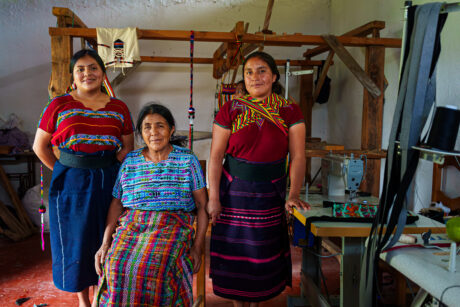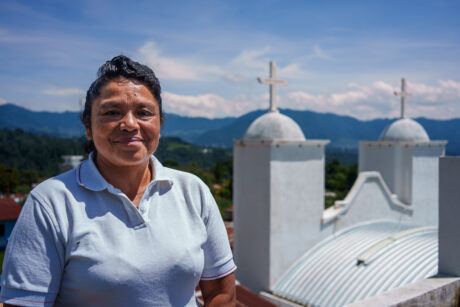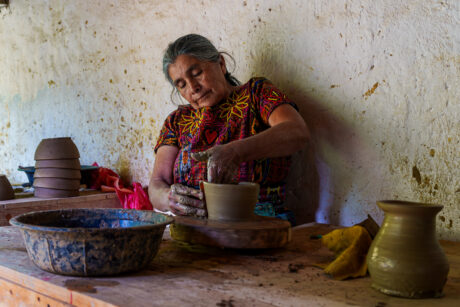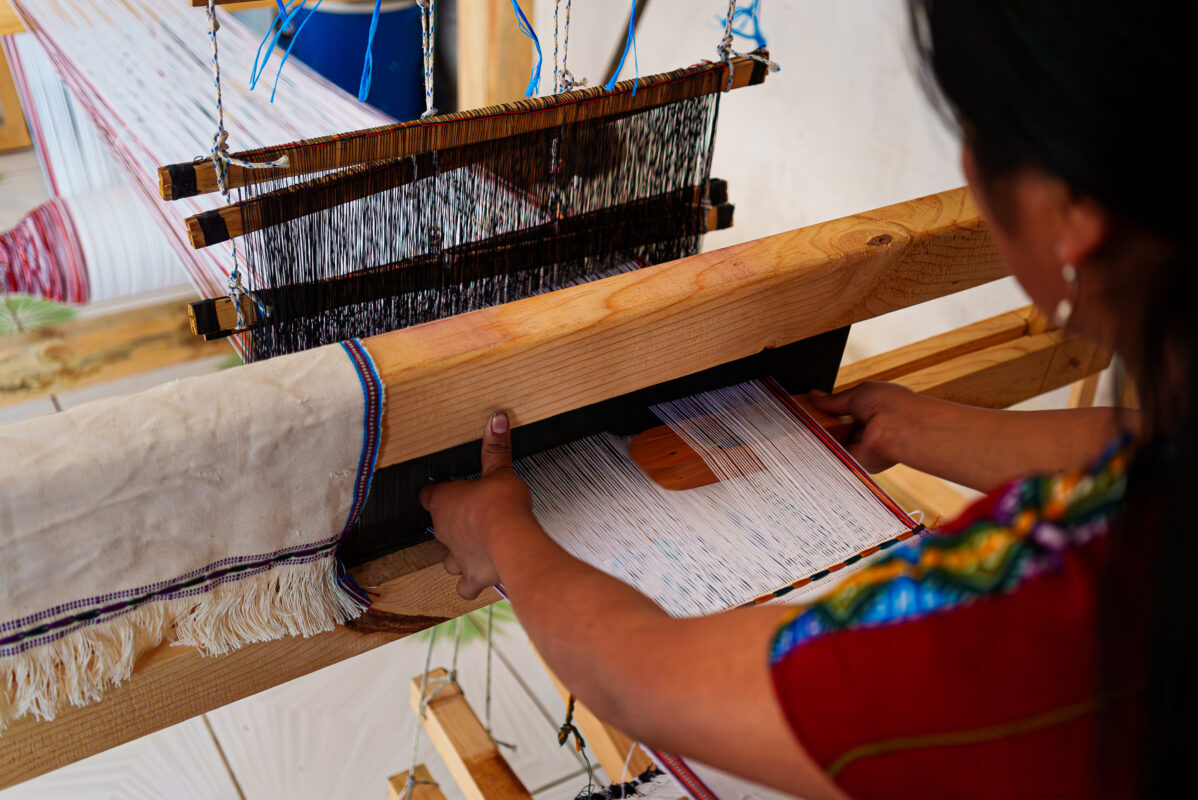In the Western Highlands of Guatemala, 40 women gathered to practice the ancient art of weaving traditional Maya patterns. Participating in the first session of a three-part workshop series, they were learning a new skill: Weaving these designs into footwear.
“I’ve never been to a training like this,” says Heidi Ortiz, a participant in the workshop. “I know that this will be useful in the future for me and for my kids.”
Hosted by the U.S. Agência para o Desenvolvimento InternacionalProjeto de Construção da Paz (conhecido como Projeto Tecendo a Paz em espanhol), a project that works with remote and often under-resourced communities to address and resolve social conflict, the workshops were about more than making shoes. Tejiendo Paz created the series as part of a multipronged response to what the San Pedro Necta community expressed as its greatest challenges – gender discrimination and violence against women.
“An approach to this conflict is to empower women economically,” says Marlyn Garcia, a community facilitator for Tejiendo Paz and native of Huehuetenango. “They know how to weave their garments, por isso foi essencial dar-lhes uma nova ferramenta ou conhecimento de como fazer outra coisa com este tecido.”
Tejiendo Paz organizou o evento junto com parceiros nacionais e municipais, incluindo oComissão Municipal de Segurança Alimentar e Nutricional(CAPACIDADES), the Municipal Women’s Office(DMM) e oSecretaria de Segurança Alimentar e Nutricional(SEXTO). Os parceiros do governo forneceram às mulheres um kit de ferramentas de costura, suprimentos iniciais e tecido, bem como orientação de branding e marketing para seus produtos. Tejiendo Paz contratou os instrutores e facilitou as oficinas. O objetivo era dar-lhes as competências necessárias para criar um produto de nicho com potencial para gerar uma nova fonte de rendimento.
Promoting economic agency and eliminating barriers to participation – with an emphasis on women and youth – are central components of Tejiendo Paz’s work in the Western Highlands.Recent research affirms that societies that oppress women are more likely to show higher levels of violence and instability. In this way, Tejiendo Paz organized these workshops to promote gender equity in the region.
“Building skills and supporting a paradigm shift in gender roles in terms of both economic and civic empowerment are part of building more peaceful communities that are better able to cope with conflict,” diz Sara Barker, Tejiendo Paz’s Chief of Party.
Preserving cultural identity
In San Pedro Necta, women reported another layer of gender discrimination. Nas reuniões comunitárias, they shared that not being able to afford traditional clothing prevents them from participating in leadership roles and decision making in their communities. This new source of gender discrimination adds to what they already experience in a country with high levels of gender violence.
“There is a lot of embarrassment around not being able to afford traditional clothing,” says Marlyn. “The migration of women to other countries for economic resources and for the ability to afford this kind of clothing contributes to the disintegration of families.”
As globalization affects indigenous communities around the world, torna-se cada vez mais difícil para as pessoas manterem as tradições enquanto ganham a vida na economia moderna. O primeiro workshop da série de Tejiendo Paz, chamado “Conservação da Identidade Cultural,” abordou essa questão no contexto da equidade de género e do empoderamento económico.
“É importante preservarmos as nossas tradições e costumes para não os perdermos,”diz Felina Bravo López, presidente de um grupo de mulheres em San Pedro Necta. “Vejo muitas mulheres usando calça e blusa porque é mais barato e perdem o uso da roupa tradicional, mas não deveria ser assim. Mas eu entendo como é caro comprar roupas tradicionais, então o tecido[o curso] doados irão mitigar esse custo.”
These trainings are also intended to be a launching point for future projects and community work.
Matilde Bravo, Manager of the Municipal Women’s office in San Pedro Necta, expressed her enthusiasm for the workshops.
“I am very proud to be here and I’m very proud of the other women with me, they are really enthusiastic about this course in making traditional shoes,” she says “And we don’t want this activity to end here, we want to continue doing activities like this with our partners.”
A broader vision for gender equity
In meetings facilitated by Tejiendo Paz, members of target communities identify key conflicts and obstacles to finding peaceful resolutions. These sessions culminate in “community visions,” which become guides to point both individuals and governing bodies to appropriate resources as well as roadmaps to shape community development. Tejiendo Paz has delivered 27 such plans across the departments of Huehuetenango, Totonicapã, Quetzaltenango and San Marcos.
In many of these communities, Tejiendo Paz organizes women’s networks that offer leadership support and solidarity in addressing gender violence and discrimination. Along with economic empowerment, civic empowerment is the other side of the coin in shifting gender paradigms. Marlyn describes how a host of obstacles bar women from civic participation.
“In theory, women’s rights are the same as men’s, but in practice this isn’t the case,”ela diz. “Inequality in education, discriminatory attitudes and institutions and lack of access to other services prevent women from getting involved politically.”
The sewing workshop series was thus a space to share information about women’s rights and capacity for meaningful civic engagement in addition to small business advice.
“We see that the women that participated [in the sewing workshop] are leaving really motivated to continue promoting the improvement of their communities,” says Beldis Vasquez, an employee in San Pedro Necta’s municipal office.



